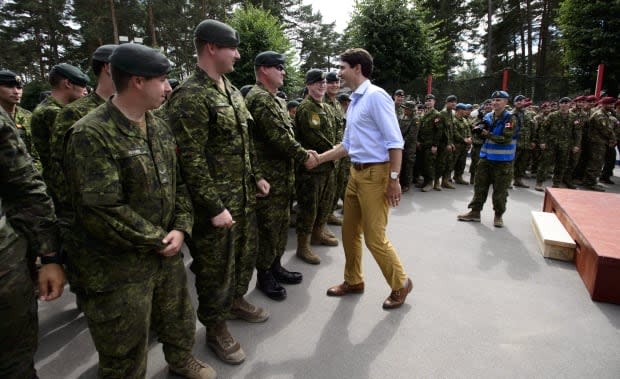As talks with Russia stall, NATO chief warns of a new war in Europe

The threat of a new war in Europe is very real, NATO Secretary General Jens Stoltenberg said Wednesday following talks with Russia at the military alliance's headquarters in Brussels.
Stoltenberg's warning was delivered as the Trudeau government faces rising political pressure from the vocal Ukrainian diaspora community in Canada to do more to help deter an invasion by Russian troops.
The meeting of the NATO-Russia Council ended without a firm commitment to more dialogue over Moscow's demands. Russia is insisting that Ukraine be denied NATO membership and that the deployment of alliance troops and equipment in eastern Europe be rolled back to 1997 levels.
Those demands have been rejected entirely by the alliance. Wednesday's four hour meeting between NATO ambassadors and a Russian delegation was a "defining moment for European security," Stoltenberg said.
NATO was prepared to negotiate with Russia about military exercises, arms control and missile deployments, he said —but it won't allow Moscow to decide which countries can join the alliance.
"There is a real risk for new armed conflict in Europe," Stoltenberg said at an availability following the meeting.
"There are significant differences between NATO allies and Russia. Our differences will not be easy to bridge, but it is a positive sign that all NATO allies and Russia sat down around the same table and engaged on substantive topics."

Moscow has repeatedly denied it is planning to invade Ukraine — but on Tuesday over 3,000 Russian troops conducted a live-fire exercise close to the border. Russian President Vladimir Putin has insisted that his country needs written security guarantees that there will be no further NATO expansion.
Stoltenberg said any use of force against Ukraine by the Russians "would be a serious strategic mistake" for which Russia would pay a high price.
His comments were echoed Wednesday by Prime Minister Justin Trudeau, who said he condemned "in no uncertain terms" the threat of Russian aggression during a phone call the day before with Ukrainian President Volodymyr Zelensky.
'Significant consequences' for Russia
"We are all extremely concerned about that and are united as allies around the world in calling on Russia to de-escalate and [have] indicated that there will be significant consequences in the form of sanctions if further aggressive actions are taken by Russia," Trudeau said.
He also said Canada will "continue to be there," referring to the military training mission in Ukraine and the deployment of Canadian troops as part of a NATO-led battlegroup in Latvia.

Ukrainian-Canadians alarmed at the prospect of war have been calling on the Liberal government to do more to help Ukraine through diplomacy and by shoring up its defences.
Last month, the Ukrainian Canadian Congress (UCC) submitted a series of policy recommendations to Foreign Affairs Minister Mélanie Joly. At the top of the list was a proposal to ship more defensive weapons to Ukraine, including anti-tank, anti-artillery, naval and air defence systems.
Joly has not ruled out increasing military support to Ukraine — an option the federal government has been reviewing for months.
Allies cut off equipment shipments to Ukraine
Following the dissolution of the Soviet Union, Ukraine was left with a vast military industrial complex capable of producing everything from tanks and armoured vehicles to aircraft and ballistic missiles. But many of the sophisticated modern systems used by NATO allies — such as the Javelin anti-tank missile — were not in their inventory.
In October, the U.S. shipped 30 tank-busting guided-missile systems as part of its annual military aid package, but the Ukrainian government is still seeking other high-tech equipment.
When Trudeau met with Zelensky in the summer of 2019, the Ukrainian president expressed interest in acquiring Canadian armoured vehicles, which have an advanced design and are built to withstand powerful improvised explosives.
WATCH | Kyiv officials are inspecting hundreds of Cold War-era bomb shelters
With tensions running high over Ukraine, some of Canada's allies have blocked shipments of defensive equipment to avoid further aggravating Russia. The UCC pointed to Germany's refusal to allow the "purchase of anti-drone and anti-sniper systems via the NATO Support and Procurement Agency."
The UCC also wants to see Canada restore Ukraine's access to advanced satellite data — something the former Conservative government granted for a limited time after Russia's annexation of Crimea.
It also called for more sanctions on Russia, noting that in the years since Canada last imposed sanctions in March 2019, the United States and the European Union have moved to punish a Russian private security company, the Wagner Group.
The EU accused the Wagner Group of human rights abuses in Ukraine and a host of other countries, including torture and extrajudicial executions.


